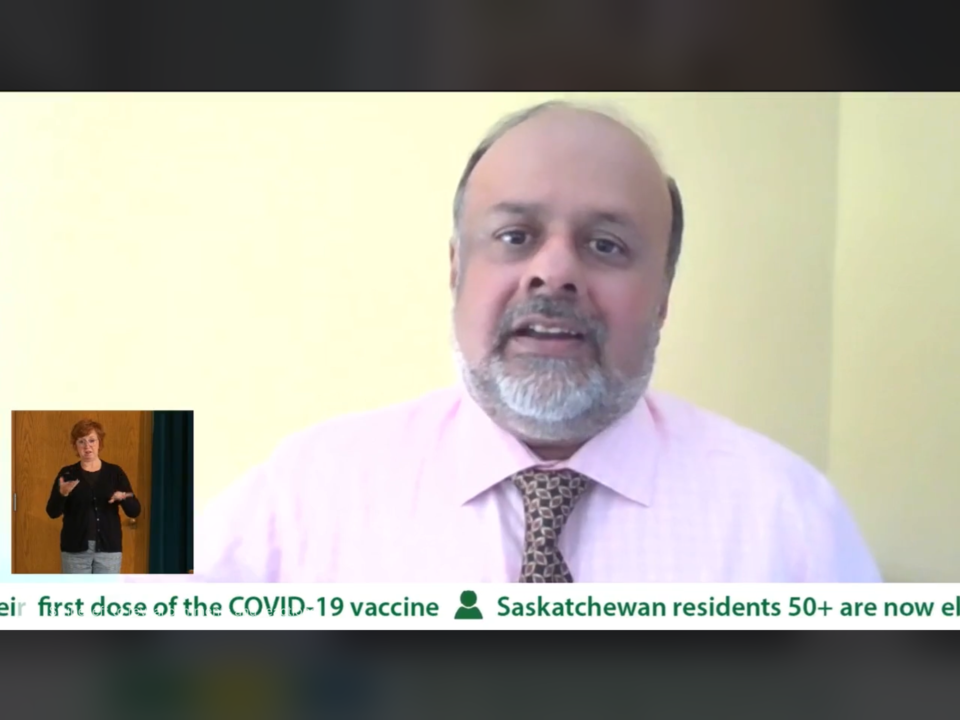We are now entering a new phase of COVID-19, according to Saskatchewan Chief Medical Health Officer Dr. Saqib Shahab.
That phase is how we all learn to live alongside COVID-19.
The previous 15 months had been mainly about “managing a pandemic,” Dr. Shahab said while appearing virtually at the latest provincial update Tuesday. The last six months, and especially the past three months, had been about “getting vaccinated.”
“Now as we move forward, especially after Step Three, we all need to know how to live with COVID,” Dr. Shahab said.
“COVID will be a pandemic in many parts of the world, unfortunately, for the next several months. But thankfully we can look forward to a time in the near future where it will be an endemic and less deadly thing that will be around in lower numbers in Saskatchewan and likely most parts of Canada ...”
What officials are seeing, with improving vaccination numbers and despite variants, was that when outbreaks are analyzed, most transmission happened with people who weren’t vaccinated or had one dose less than three weeks before.
“Ultimately what we are seeing, both in Saskatchewan and some other jurisdictions, is that once you have low case numbers, once you have a high vaccination rate, one-dose then two-dose, you do reduce the risk of large super spreader events. But having said that I must concede [the] risk will always be there in pockets where people are unvaccinated.”
Premier Scott Moe echoed Dr. Shahab’s thoughts.
“As Dr. Shahab said, we do need to transition to learning how we are going to live with COVID,” Moe said. ” And that’s going to be different. I’ve always said that previously that we need to get vaccinated not only to keep ourselves safe but to keep those around us safe. That’s still true to a degree. But now as we learn to live with COVID I think it’s fair to say you need to consider getting vaccinated to keep yourself safe.”
He pointed again to statistics provided a week earlier, indicating that upwards of nine out of 10 people who get COVID-19 are people who have not been vaccinated.
A number of the questions from reporters at the news conference raised alarms that the more infectious DELTA variant could enter Saskatchewan and could yet pose problems with reopening. The British government has already pushed back its reopening by four weeks because of the spread of the DELTA variant.
There were also concerns expressed about opening up Saskatchewan Roughriders games to full capacity at Mosaic Stadium, with reporters citing a large number of fans attending having had only one vaccine dose or possibly no doses at all.
When pressed on whether Rider games would be safe, Dr. Shahab responded “going forward, obviously we can’t stay in a pandemic forever.”
“We are reaching a point where with our high vaccination rates, low case numbers, we have to, initially in the summer with outdoor events, start having gatherings in a way that for vaccinated people it’s going to be extremely safe. For unvaccinated people — who should really wear a mask if they do attend certain events, but there would be no way to monitor that — it may be safer, but not as safe as if you are fully vaccinated after your second dose …
“Once public health orders and restrictions end, it really will be up to each individual to assess the risk for themselves and their family as they engage in these events.”
Dr. Shahab also reiterated that as “an endemic, vaccine-preventable disease, the safety of yourself and your immediate family will be determined to a large extent by your vaccination status, whatever the setting is.”
In his remarks Premier Moe reiterated the need to “live with COVID.”
“We don’t get out of COVID. I think what we need to look at is how we live with COVID. I don’t think we’re going to ‘get out’ of it, we’re going to learn how to live with COVID. And by far and away the tool that we have that is most effective for protecting us as we do live with COVID, is to receive your full sequence of vaccinations — your first shot, wait your allocated time period, and then receive your second shot.”



